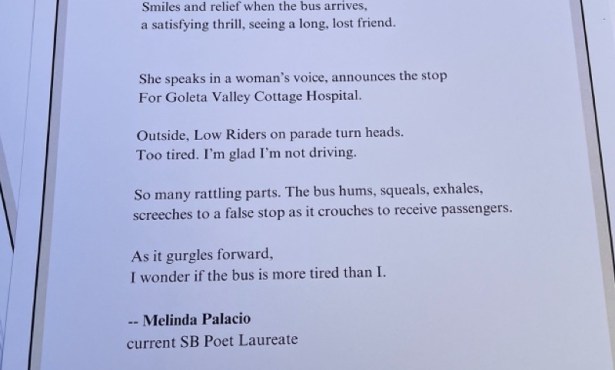In the Arms of Angels
Seized by a Stroke, Denise Bacchus Is Mended By the Folks at Cottage Hospital
“One Love! One Heart!” Bob Marley rocked me down Cliff Drive and into my apartment parking space. My serenity was broken when I reached for the keys with my right hand and I felt a shudder roll through the right side of my body. What the hell was that?
Somewhere between the conscious and unconscious, I called for help. My voice squeaked into a closed window. No one heard. Calmly, I grabbed my bag from the seat, opened the door, and stepped onto the concrete yard. I stumbled, but I kept walking, aware that my right hand was losing its grip on my bag. In the shadows of my mind lurked the recognition that something was slowing down my right side.

I made it to my apartment, but the physical warning sent me to my neighbor’s door. I rapped weakly and called, but there was no stir. I got my cell phone, which took some time as the phone kept slipping out of my hand. The little buttons were hard to press, but I concentrated, and slowly success came. I called a friend to ask for permission to ignore my body. I was aware of my own refusal to accept that anything serious could be at play. After all, I was only 52 years old and healthy.
That friend was not at home, but a family member answered; she suggested that I go to the emergency room. I refused. I had had an experience at the emergency room that kept me away from the medical profession for years. She pushed. I told her that I didn’t think I could drive. My friend sent her brother. I sat on a stool in my apartment with the door open and waited. By this time, I was not able to keep my balance. Andy arrived and escorted me to the car.
At the Emergency entrance of Cottage Hospital, Andy asked if I needed the wheelchair. I didn’t think so, but, to my surprise, my body did not respond; I had to be helped to the wheelchair and pushed into the building. From there, things moved fast. I was quickly in the hands of two nurses. They were young, blond, pretty, and friendly. And I, in the midst of trying to deflect fear and anxiety, kept up a continuous and humorous chatter.
A what? A catheter! Where? You are not serious. In response to their affirmative answer my chatter got faster and funnier. Humor was my armor against this absolute invasion of body and privacy. I told them that any such action would bypass friendship and go directly to intimacy and would mean the sharing of family details. They laughed. I laughed, too, as tears were quietly pooling inside. I recognized that I was dependent on their kindness. I clung to their smiles.
In the midst of my trauma, Dr. Delio appeared. He calmly looked at me and said, “Ms. Bacchus, you are having a stroke, and I need to know now what time it started.” A stroke! I looked at him with some confusion but tried to calculate the time spent between my parking the car and the present. “Why is the time important?” I queried. He explained that he only had a three-hour window to give me t-PA — a powerful blood thinner. If he didn’t act fast, he would miss the chance, and that could leave me with debilitating results from the stroke.
The information swam in my brain. I looked at Dr. Delio’s face. I saw intelligence, concern, compassion, and confidence. The qualities he exhibited earned my trust, and I gave him permission to use a blood thinner.
Time flew. Vitals were taken and came back normal. Dr. Delio suspected a PFO; I was sent for a bubble test of the heart to confirm his suspicion. The test was positive. I had, unknown to me, a patent foraman ovale — an open flap in the heart. A clot had escaped into my bloodstream and headed to my brain. That clot had broken in two; one headed to the right side and the other to the left. Together, they blocked the blood vessels and were slowly starving the cells of oxygen and sentencing them to death. In doing so, they were taking from me abilities I took for granted.
By this time, there were constant tests — the nurses checking the movement of my feet, my ability to keep my hands up and at the same level, to stick out my tongue, to smile … My right side was losing movement and feeling; my speech was slurring. Emotionally, I was somewhat removed from what that meant. I kept laughing.
The nurses smiled and apologized as they stuck needles in my veins and started infusions. They rolled me to the MICU (Medical Intensive Care Unit). Every hour a nurse checked my vitals and my responses to tests. “Stick your tongue out” became a joke. Somewhere in my brain I was surprised that I felt no panic. Again I clung to their smiles, their patience, their compassion.
Paralysis stunned me. My right side was no longer mine. It existed like dead meat hanging off of my shoulder bone. In a matter of hours, I was totally dependent on others for everything. I learned that brain cells die when injured. Some of mine were either dead or badly injured. Under the heavy weight of this information, a struggle began. The sweat appeared on my brow as my body refused to perform the simple act of rolling over, and my mind tried to digest the mental shock of this lack of cooperation. I focused on movement. I did not sleep. I kept pushing my fingers to open and close. I willed and I willed … and they did, those fingers got moving.
The MICU was a mental and physical struggle. The time was a journey I did on my back, staring at the ceiling. After three days, I was moved to the neurological wing of the hospital. The nurses welcomed me and opened for my personality; they allowed for my individuality, and in so doing, they kept me whole. I called, they came; I talked, they listened; I asked, they answered. They helped me mend.
Physically, there was more movement in my fingers and in my foot; I could stand. Strength to my hand and my leg returned slowly. The nurses’ laughter and their kindness drew me back into the fight for life, for limb … I leaned again and again. I needed them.
One day, I pushed even harder. I saw a walker leaning against the wall and figured, if I tried, with some help of course, I could make those short strides. I could wobble over to it, put my hand on that walker, and take back a part of my life. When the nurse arrived, I asked if she would shadow my backside, keep my robe from flapping, and catch me if I started to fall. She stayed close, and I made it to the walker. After that, I kept it by the bed and quickly found a limited independence. Soon enough, I attempted to manage without the walker a little at a time.
I was so caught up in my progress that it took some time for me to realize that my healing progress was moving a lot faster than expected. The nurses were pleasantly surprised, encouraging. The excitement of good news fueled my body, and I could almost feel those new neurological pathways revealing themselves.
I had a plan, and it included Dr. Delio. I was going to surprise him. He was expecting walker; I would give him walking. Time had given me an understanding of his profession. A shocking one to two percent of stroke victims made it into the Stroke Center within that crucial three-hour window. One or two out of 100 people get the chance I was given. Stroke was the primary cause of disability; it was the fourth cause of death.
It occurred to me that nurses, doctors, and therapists of neurology must deal with an overwhelming number of people who are incapacitated by brain injury — a lot of paralysis, loss of cognitive abilities, struggles with depression. What must it be like to be that face that someone sees as they try to wrap their minds around incredible loss of abilities and of independence? What must it be like to be that thin membrane between a smile and a tear?



